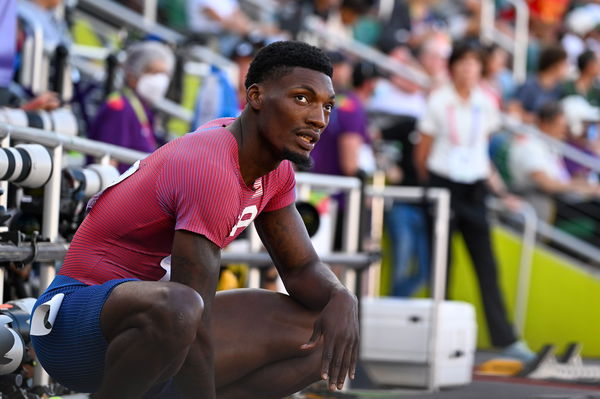

“Indoor is indoor. The real dogs come and play outdoors.” Fred Kerley doesn’t mince words in February 2025. Never has. The Tokyo Olympic silver medalist’s latest jab landed with precision timing just as Noah Lyles basked in the glow of his dominant 60m victory at Boston’s New Balance Indoor Grand Prix, and with a blistering 6.52 seconds, the reigning Olympic champion left competitors in his wake – but Kerley wasn’t impressed! If you have been following his back-and-forth with Noah Lyles? There’s no love lost between them. It’s that real competition that makes the track so fascinating! Well, we’ve seen the glitz and the relays, but what about the warm-ups, the locker room vibes, and the silence after a fall? Fred brings us in.
Fred Kerley kept it real on The Pivot podcast released today on YouTube. When asked why there’s little camaraderie in track and field, he didn’t hesitate: “It’s a Grammy game. We only have teammates on the 4×400 and 4×100. We not teammates in no individual race.” His words came after the host recalled a chat with Masai Russell. They’d asked if she consoled Alaysha Johnson after she fell in the women’s 100m hurdles final in the Paris Olympics. Paris Olympics Gold Medalist’s reply? “Nah, I ain’t got no friends.” That’s when Fred chimed in!
Unlike team sports, track and field, especially at the elite level, is structured around individual success. Even when athletes represent the same country, they often train under different coaches, in different cities, with different sponsors and support teams. That separation extends right through the competition environment: “We not—probably not even warming up together. We are enemies against each other, and we all represent the United States,” Kerley explains.
ADVERTISEMENT
Article continues below this ad
He adds that this mindset is not exclusive to the U.S. sprinters. “That’s not only for our country. That’s for most of every country,” he says. In events like the World Championships or Olympics, sprinters from the same nation are often each other’s toughest rivals. For instance, in the Tokyo 2020 Olympics, Kerley, Ronnie Baker, and Trayvon Bromell were all part of Team USA, but only Kerley made the 100m podium. “It’s an individual success. This is not team success. Like, my medal is my medal. I’m not giving you my gold medal.” That’s the stakes!

via Reuters
Paris 2024 Olympics – Athletics – Men’s 100m Round 1 – Stade de France, Saint-Denis, France – August 03, 2024. Fred Kerley of United States reacts after taking first place in heat 8 REUTERS/Alina Smutko
Even when the hosts suggest that elite U.S. sprinters should naturally have camaraderie, Kerley pushes back. “We don’t. I’m telling you—we don’t… We not warming up at the same time. No—none of that.” And his point about Noah Lyles?. “I think I saw Noah probably like once or twice, and that once or twice is probably opening ceremony and probably the party.” He further added, “I ain’t see nothin’ like that. It’s just like — y’all see what y’all see on TV, and we all like together — we not together. We not warming up together, nothing. Everybody really enemies, you know what I’m saying?”
Why? Because there’s little overlap unless they’re on a relay, and even then, it boiled down to the financial ecosystem of track! “Even we go win the relay—they don’t care,” says Kerley. “The contract’s not saying ‘Oh this person won this, so everybody gonna want that.’ What’s in my contract is not in his contract or not in her contract.” It’s a solo pursuit. “If I go win—for the bronze—my money is my money. I’m not splitting that between nobody else.”
Continuing further, he said, “Everybody not breaking the same bread, you feel me? So it’s just like — we — like we are all — everybody’s contract is not the same in track and field. Some making millions, some people making nothing. So it’s a grimy game. You trying to get every penny out, and nobody gonna stand in nobody way.”
But, that’s not it, as Fred Kerley also talked about financial and sponsorship problems in track and field!
What’s your perspective on:
Fred Kerley says track is a solo game—do you agree with his no-friends approach?
Have an interesting take?
Fred Kerley sheds light on his track and field struggles
Fred Kerley kept it real on The Pivot Podcast, laying bare the challenges athletes face beyond the track. “You gotta be the number one,” he said, explaining why sponsorships in the U.S. don’t come easy. If you’re not at the top, deals don’t line up at your door. Kerley knows this first-hand. After a five-year stint with Nike, he switched to ASICS in early 2023. But things took a turn at the 2024 NYC Grand Prix when he forgot his spikes at the airport. To compete, he borrowed a pair of Puma shoes. That single act cost him big time: he didn’t even start the race, and ASICS cut ties with him.
Kerley pointed out how hard it is for track athletes to get recognition. “Most of us track guys get belittled and stuff most of the time,” he said. It’s not just about medals. It’s about visibility, and sponsors don’t always see the whole story.

ADVERTISEMENT
Article continues below this ad
“A lot of people don’t understand where you come from… everybody in the track community got a need, but a lot of people can’t [express it],” Kerley added. For many, it’s not just a sport. It’s survival, and the system doesn’t always make room for that.
ADVERTISEMENT
Article continues below this ad
ADVERTISEMENT
ADVERTISEMENT
ADVERTISEMENT
ADVERTISEMENT


Fred Kerley says track is a solo game—do you agree with his no-friends approach?